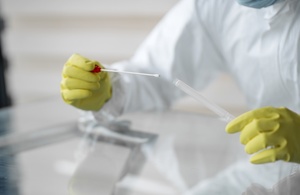Clinical evaluation confirms high accuracy of highly mobile LamPORE test
A technical and clinical evaluation conducted by NHS trusts and universities has confirmed the LamPORE COVID-19 test, produced by Oxford Nanopore, to be accurate and sensitive enough to detect the virus in people with and without symptoms.
LamPORE test technology is a highly mobile and scalable solution – it can be operated in traditional laboratory settings, as well as smaller spaces. This means the technology can be quickly deployed to areas to provide additional testing capacity where it is needed for large numbers of people, alongside existing PCR testing capacity and community testing using lateral flow tests.
LamPORE uses swab samples in the same way as a traditional PCR test, but also shows high performance with saliva samples. The LamPORE test was assessed on saliva and swab samples from symptomatic and asymptomatic participants. With samples from asymptomatic participants, the LamPORE test was found to have an overall sensitivity of 99.57% and specificity of 99.4%, meaning the test is highly effective for testing people without symptoms in the community.
As well as detecting SARS-CoV-2, LamPORE is in development for the detection of other respiratory viruses at the same time, including flu and respiratory syncytial virus (RSV).
LamPORE technology is currently being piloted for use in mobile laboratories. In these pilots, pop-up laboratories which can process tests on-site using LamPORE technology have been set up in trucks which can travel to areas where there is a need for testing, processing up to 2,000 tests a day.
There are currently 4 mobile LamPORE units, deployed in Aberdeen, Telford, Brent and Newbury, being piloted to provide local testing services. This week, the first LamPORE mobile laboratory to arrive in Scotland started testing in Aberdeen, where it will move around to provide testing for those in remote locations. Pilots will continue into next month, followed by an evaluation of the mobile units.
LamPORE technology combines loop-mediated isothermal amplification (LAMP) and nanopore sequencing to provide highly scalable detection of COVID-19. The test is CE marked for usage with the Oxford Nanopore GridION device, which can process thousands of tests a day.
Health Minister Lord Bethell said:
With one in three people not displaying symptoms of COVID-19, broadening asymptomatic testing is critical to protect those at highest risk. Oxford Nanopore’s LamPORE test is another example of British innovation leading the way, and is an incredibly useful addition to our COVID-19 testing toolkit – delivering accurate results to people with and without symptoms.
The LamPORE mobile laboratories provide a new way in which we can respond to testing demand where there is most need. I am hugely grateful to Oxford Nanopore for their efforts in producing this technology.
Professor Dame Sue Hill, Chief Scientific Officer for England in NHS Test and Trace, who led the evaluation of Oxford Nanopore LamPORE test, said:
The LamPORE test shows very high sensitivity, so can be used for the full range of diagnostic and other use cases. This study showed it to be effective when using saliva samples from people without symptoms and it has the additional advantage of being able to detect other winter viruses, such as flu, increasing the scenarios in which it could be deployed.
Minister for Public Health Mairi Gougeon said:
I welcome the arrival of this unit, which will significantly decrease turnaround times for people being tested at mobile testing units (MTUs) and drive-through testing centres in the north east.
This follows the expansion of our community testing programme through the national MTU fleet, which is operated by the Scottish Ambulance Service. In partnership with the UK government, and through additional funding of £800,000 from the Scottish government, this fleet will grow from 18 to 42 by March 2021, with capacity to reach 84 communities.
We will continue to work with the UK government and local partners to improve access to COVID testing. However, it’s important to remember testing is only one layer of protection – all others, including vaccination and the FACTS guidance work to greatest effect when they work together, so it is essential people continue to follow the restrictions currently in place to suppress COVID to the lowest possible level in Scotland.
Dr Gordon Sanghera, CEO of Oxford Nanopore, said:
This remarkable study is a testament to the scientific teams who worked so hard over the summer to validate a new generation of diagnostic test.
We believe there are phenomenal opportunities here: not only to deliver high quality COVID testing, but to catalyse the development and delivery of real-time, data-rich clinical testing using nanopore sequencing. This has the potential to tackle infectious disease and to reach into cancer, rare disease, and tissue typing/immunology.

